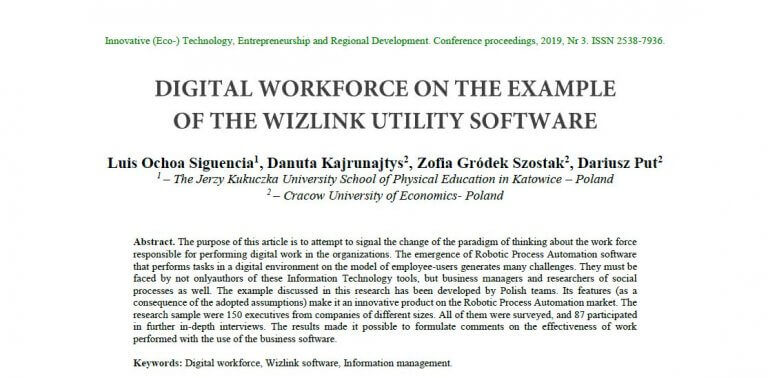The international journal Energies published an article written by prof. dr Andrzej Sobczak and Leszek Ziora The Use of Robotic Process Automation (RPA) as an Element of Smart City Implementation: A Case Study of Electricity Billing Document Management at Bydgoszcz City Hall.
The subject of the article is focused on the use of RPA technology to build smart cities.
This article is based on the case study of the robotic process automation of electricity billing document management at Bydgoszcz City Hall.
The RPA project at the Bydgoszcz City Hall was implemented by the ForProgress team. Due to formal requirements and a friendly licensing model, the Wizlink tool was selected for robotization. Thanks to the implemented improvements, the City Hall has increased the efficiency of performed tasks.
Energies is an international journal in energy engineering and research. The journal publishes original papers, review articles, technical notes, and letters. The journal provides a forum for information on research, innovation, and demonstration in the areas of energy conversion and conservation, the optimal use of energy resources, optimization of energy processes, mitigation of environmental pollutants, and sustainable energy systems.
Energies is published by MDPI – an academic open access publisher, established in 1996 in Basel. MDPI publishes over 250 peer-reviewed open access journals across ten different fields. Main aim of the publisher is to foster scientific exchange in all forms, across all disciplines.
Abstract: Smart cities are an extremely important, multi-faceted subject, both in terms of their practical aspects and in terms of research. This is expressed, among other things, in the multitude of approaches to this concept. These approaches differ based on the emphasis placed on individual aspects: some focus more on technology, and others put more weight on social issues, while still others value sustainable development issues. Currently, an important topic of discussion about the development of the smart city—the importance of which has become even greater in the context of the COVID-19 pandemic—is the digital transformation of the city. The use of robotic process automation (RPA) tools can be a part of such a transformation, as such tools, using advanced software, enable the automation of those tasks carried out thus far by humans. Although such an approach has, to date, been widespread in the case of enterprises (in particular, those operating in the financial and BPO/SSC sectors, but less often in the utilities sector, the first applications of these solutions in the context of process automation for cities are also beginning to emerge in various parts of the world. This article is based on a case study approach. The implementation conditions (including the constraints) of such an approach, the benefits achieved, and the lessons learned (which can be important for other local government units) are outlined using the example of the Bydgoszcz city hall’s (Poland) electricity billing document management. The results of the case study presented here lead to the conclusion that the use of RPA tools enables, very quickly and at relatively low cost, measurable results to be achieved that are related to the processing of electricity billing documentation for the city of Bydgoszcz. This allows the assertion to be made that robotic process automation can be taken into consideration as one of the tools used to build smart cities. Read full article here: https://www.mdpi.com/1996-1073/14/16/5191/htm




